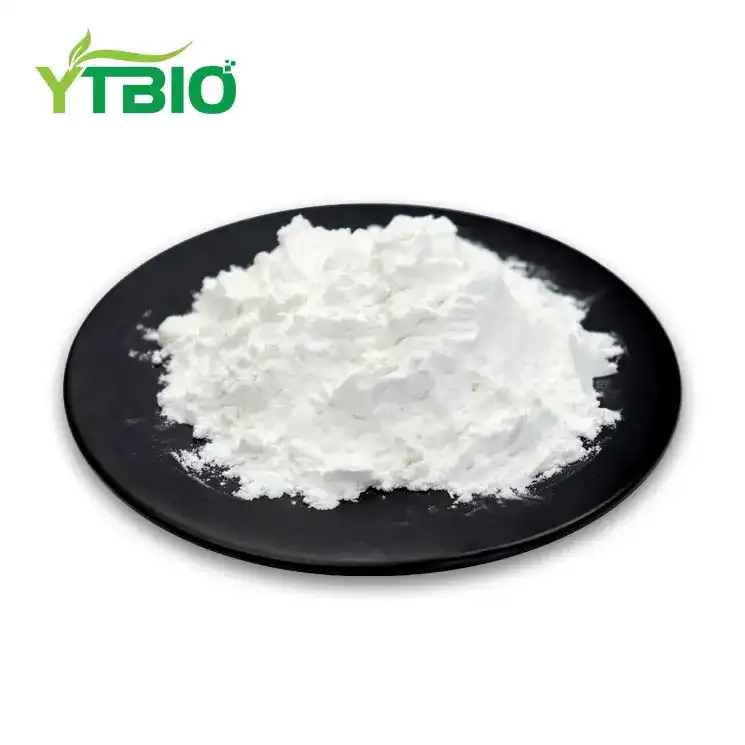Bulk L-selenomethionine Powder
Detection method: HPLC
CAS: 3211-76-5
Molecular formula: C5H11NO2Se
Molecular weight: 196.11
EINECS: 608-705-0
Appearance: white powder
Physiological activity: Antioxidant capacity, improve immunity,cardiovascular health, etc.
Water solubility: soluble
- Fast Delievery
- Quality Assurance
- 24/7 Customer Service
Product Introduction
What is Bulk L-selenomethionine Powder?
Bulk L-Selenomethionine powder is a white to off-white chiral amino acid powder, which is stable at room temperature, soluble in water and alcohol solvents, and insoluble in ethers. It has typical physical and chemical properties of amino acids (and special activity of selenium. As the most important form of organic selenium in nature, its L-configuration has high bioavailability, can significantly improve the expression of glutathione peroxidase, and has antioxidant, immune regulation, reproductive function (such as improving sperm motility) and other effects. It can be used as a safe and efficient selenium supplement for human nutrition, as well as a feed additive. It is widely used in livestock and poultry farming to promote animal immunity and fertility. At the same time, it is widely used as an active amino acid model compound in basic biochemical research.
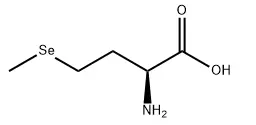
Structure of L-Selenomethionine
YTBIO: Supply Bulk L-selenomethionine Powder
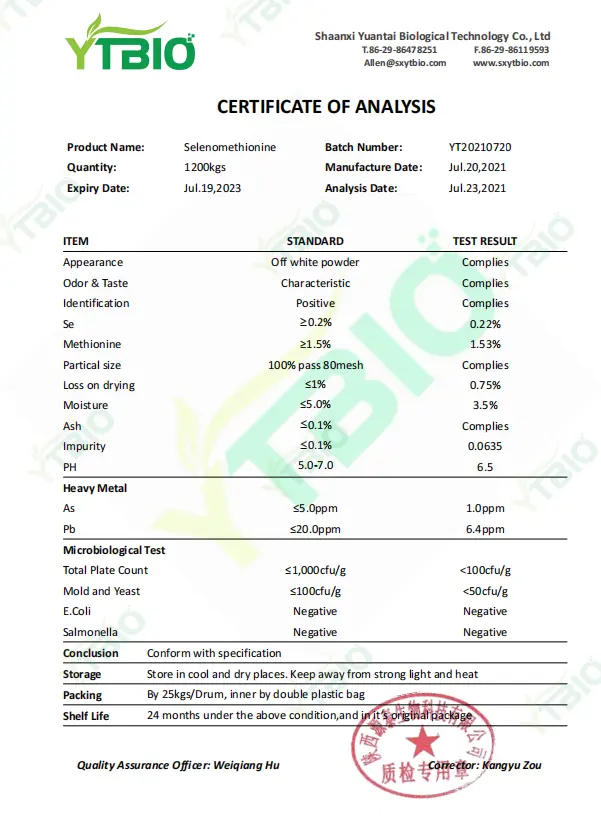
What are the effects of Bulk L-selenomethionine Powder?
1. Antioxidant and anti-inflammatory
Bulk L-selenomethionine Powder neutralizes free radicals and reduces the damage of oxidative stress to cells by participating in the synthesis of glutathione peroxidase (GPX). This antioxidant ability can delay aging, reduce the risk of chronic inflammation, and fight oxidative damage caused by external factors such as environmental pollution or ultraviolet rays.
2. Enhance immune function
Selenium is an important factor in the activation of immune cells (such as T cells and natural killer cells). Essential elements for the body. L-selenomethionine can regulate immune responses and help the body resist viral and bacterial infections. Studies have shown that selenium deficiency may increase susceptibility to diseases such as influenza and hepatitis, and appropriate supplementation can improve immune function.
3. Thyroid hormone metabolism support
The thyroid gland is one of the organs with the highest selenium content. L-selenomethionine participates in the deiodination process of thyroid hormones (T4 converted to active T3) to maintain hormone balance. Selenium deficiency may lead to an increased risk of hypothyroidism or autoimmune thyroiditis (such as Hashimoto's thyroiditis).
4. Detoxification and metabolism promotion
Selenium and heavy metals (such as Mercury, lead) has a strong affinity, can form a complex and accelerate its excretion. In addition, L-selenomethionine helps remove toxins by supporting the activity of detoxification enzymes in the liver, and participates in amino acid metabolism to maintain normal protein synthesis.
5.Other benefits
Cardiovascular protection: Selenium may reduce the risk of atherosclerosis by reducing the level of oxidized low-density lipoprotein (LDL).
Neuroprotection: The antioxidant properties of selenium may have a potential protective effect on neurodegenerative diseases such as Alzheimer's disease and Parkinson's disease.
Reproductive health: Selenium is required for male sperm formation, and appropriate supplementation may improve sperm quality.
Bulk L-selenomethionine Powder in selenium-enriched yeast
Bulk L-selenomethionine powder: The sources are chemical synthesis and natural sources, but currently industrial production mainly relies on chemical synthesis routes.
Bulk L-selenomethionine Powder is an important source of trace element selenium necessary for human health. Selenomethionine is found in various foods, including selenium-enriched yeast. Selenium replaces sulfur in the amino acid methionine. Its structure allows it to be incorporated into proteins instead of methionine, making its bioavailability better than inorganic selenium forms such as selenite or selenate. Once ingested, selenomethionine is absorbed through the small intestine and enters the selenium metabolic pool, where it can be used for selenoprotein synthesis or stored in tissues for later use.


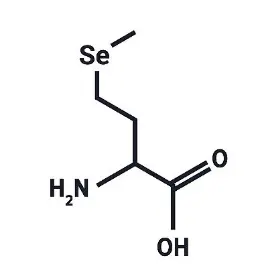
Selenium-enriched yeast
1. Selenium-enriched yeast as As a source of selenomethionine
Selenium-enriched yeast is an inactivated form of Saccharomyces cerevisiae that is highly regarded for its excellent nutritional profile. When grown in a selenium-rich environment, selenium-enriched yeast can accumulate selenomethionine through its metabolic processes. Selenium is absorbed into the yeast's proteins, primarily in the form of selenomethionine, making it a bioavailable source of this trace element.
Selenium-enriched yeast provides a sustainable, vegetarian-based option for those seeking to increase their selenium intake. This makes it particularly attractive to vegetarians, vegans, and those who have difficulty obtaining selenium-rich animal products such as seafood or offal.
2. Biological effects of selenium
Selenium is essential for human health because it can synthesize selenoproteins, a class of proteins containing selenium, namely selenocysteine. Selenoproteins are essential for many biological processes, including:
Antioxidant effect: Selenium is a key component of glutathione peroxidase, an enzyme that protects cells from oxidative damage by neutralizing reactive oxygen species. This is also the key to selenium's beauty.
Thyroid hormone metabolism: Selenoproteins (such as iodothyronine deiodinase) regulate the activation and inactivation of thyroid hormones and are essential for metabolism and energy homeostasis.
Immune function: Selenium can enhance natural killer cells and T-lymphocyte activity to support immune system function.
DNA synthesis and repair: Selenoproteins play a role in maintaining genomic stability and protecting cells from DNA damage caused by oxidative stress.
Bulk L-selenomethionine Powder from selenium-enriched yeast is a scientifically-based, highly bioavailable source of selenium with numerous health benefits. People can enhance their antioxidant capacity, promote thyroid health, and improve their overall health by including selenium-enriched yeast rich in selenomethionine in their diet. As research continues to explore the broader impact of selenium on human health, selenium-enriched yeast rich in selenomethionine has become an important addition to a balanced diet.
Application of Bulk L-selenomethionine Powder in laying hen production
Selenium is an indispensable trace element for the body, and its excess Selenium deficiency or deficiency can cause serious harm to the animal body. However, selenium deficiency can significantly reduce the egg production rate and hatching rate of laying hens. Therefore, an appropriate amount of selenium should be added to the diet to meet the needs of animals.
At present, poultry selenium supplements generally come in two forms, inorganic selenium in the form of selenate, sodium selenite, etc., or organic selenium in the form of selenomethionine. However, the addition of inorganic selenium cannot achieve the ideal selenium supplementation effect, and may also cause potential harm to animals and pollute the environment. Organic selenium has a high absorption and utilization rate, small toxic and side effects, and is better in improving the body's antioxidant, anti-stress and immune abilities. After meeting the body's physiological needs for selenium, selenomethionine can avoid selenium deficiency again in the short term. Therefore, organic selenium with it as the main form is increasingly attracting attention from the breeding industry.
Absorption and metabolism of Bulk L-selenomethionine Powder
1. Absorption and transport mechanism
Inorganic selenium is mainly absorbed by simple diffusion, and the absorption efficiency is low. Selenomethionine (SeMet) is mainly absorbed in the ileum through sodium ions ( Na+)-dependent neutral amino acid transport system. Studies have found that after selenium is absorbed by the intestine, inorganic selenium mainly exists in the form of glutathione peroxidase (GPX), while organic selenium in the form of SeMet is mainly deposited in tissue proteins.
Selenium intestinal transport proteins play an important role in the absorption and transport of SeMet. Proteins such as b0, +rBAT, B0, and PAT1 on the brush border of the small intestine are transport carriers for most neutral amino acids, which are Na+-dependent and play an important role in the body's absorption. SeMet and selenocysteine (SeCys) It is mainly absorbed through the b0 and +rBAT systems, and under certain conditions, the absorption pathways of SeMet and Met are consistent, which provides a reference for future research on selenium transporters.
Monogastric animals have high absorption and utilization efficiency of SeMet. Studies have found that compared with SS, the selenium absorption rate of yeast selenium in laying hen diets can be significantly improved. The selenium deposition rate of SeMet in serum and tissues is high. Adding SeMet and SS to fattening pigs can significantly increase the selenium content in serum, muscle, liver, pancreas and kidney tissues, while the selenium content in muscle, liver and pancreas of the SeMet group is significantly higher than that of the SS group. There are also research results showing that the selenium content in plasma, liver and longissimus dorsi of fattening pigs in the SeMet group is significantly higher than that in the SS group. Studies on the effects of different configurations of SeMet on broilers found that the serum and tissue selenium content and serum triiodothyronine content of the DL-SeMet group and the L-SeMet group were significantly higher than those of the SS group.
2. Metabolism
SeMet has two main metabolic pathways in the body, as shown in the figure. The absorbed SeMet can replace part of Met in the body It is non-specifically incorporated into general tissue proteins and acts as a biological pool of selenium, which is converted into SeMet for use by the body when the body is deficient in selenium. Studies have found that compared with SS, the addition of different levels of yeast selenium significantly increased the total selenium in lamb whole blood and the proportion of SeMet in total selenium, as well as the activity of erythrocyte GPX. SeMet in the free amino acid pool can be incorporated into tissue proteins or degraded, of which SeMet incorporation into proteins is reversible, but its degradation is irreversible.
The incorporation of SeMet into proteins or degradation depends on the Met content in the feed. SeCys generated by SeMet metabolism in the body can be degraded into selenide in the liver, which can be converted into selenophosphate and then synthesized into selenoproteins containing SeCys, or it may be methylated to form dimethylselenol or trimethylselenium ions and excreted through urine. Selenate and selenite are directly converted into selenide to synthesize selenium-containing proteins or excreted from the body through urine.
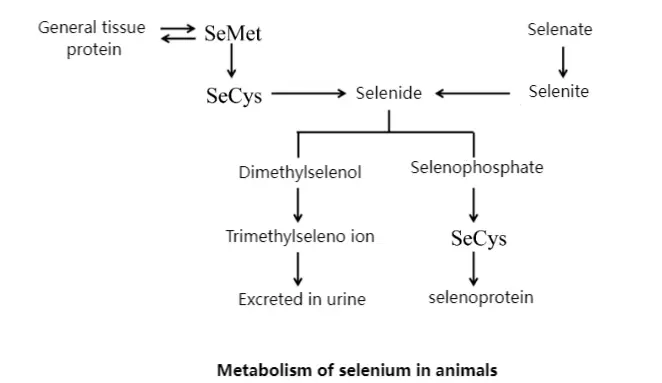
Application of Bulk L-selenomethionine Powder in laying hen production
1. Effect of SeMet on egg selenium deposition
Adding selenium to the diet can significantly increase the selenium content in eggs, among which organic selenium in the form of SeMet is more easily deposited in eggs. When 0.3 mg/kg of yeast selenium and SS were added to laying hen diets, the selenium content of eggs increased by 4.8 times and 2.8 times, respectively. The results of the study confirmed that yeast selenium can increase the selenium content in eggs. However, there is still some controversy about the research on the deposition of egg selenium by adding SeMet preparations and yeast selenium. Some studies have shown that SeMet preparations are easier to deposit in eggs than yeast selenium, and with the increase of SeMet in the diet, the selenium content of eggs increases significantly, but some research results are the opposite, which may be due to the different contents of SeMet in SeMet preparations and yeast selenium. In addition, laying hens fed with organic selenium in the form of SeMet will deposit more selenium in their egg whites, because under certain conditions, the metabolic pathways of SeMet and Met in the body are the same, SeMet can be directly deposited in egg white, while SS needs to be first metabolized into selenide in the liver, and then metabolized and embedded in selenoproteins before it can be deposited in egg white.
An important function of selenoprotein P is to reflect the body's selenium homeostasis, and it is most abundantly expressed in the liver. Studies have found that the selenium concentration in eggs is significantly similar to that in hens' livers. In addition, when 1.0, 2.4 or 5.1 mg/kg of yeast selenium was added to the basal diet of laying hens containing 0.3 mg/kg SS, it was found that the selenium content in eggs increased linearly with the increase in selenium levels, and even when the organic selenium level was as high as 3-6 mg/kg, it would not be toxic to laying hens. Studies have found that yeast selenium can synergize with Met at a certain concentration to significantly increase the selenium content in the muscle of offspring chickens of breeding hens.
2. Effect of SeMet on Egg Quality
Organic selenium in the form of SeMet is beneficial to improving the egg quality of eggs. Studies have shown that adding 0.25 and 0.50 mg/kg of yeast selenium to laying hen diets can slow down the decline of egg Haugh units during storage and extend the shelf life of eggs. Compared with SS, yeast selenium can significantly enhance eggshell strength, while significantly reducing albumen height and Haugh units. In addition, studies have found that adding yeast selenium and SeMet preparations to laying hen diets can significantly increase the yolk color of the experiment for 60 to 90 days, and yeast selenium is better than SeMet, but the soft shell egg rate in the SeMet group is significantly higher than that in the yeast selenium group, and there is a trend to reduce the thickness of the eggshell.
In summary, compared with selenium in the form of inorganic selenium salts, a lower amount of SeMet can improve the antioxidant performance, immune performance, anti-stress ability, egg selenium content and egg quality of laying hens. However, due to the complexity of biological fermentation, it is difficult to maintain the stability of SeMet content and chemical form in organic selenium products while mass production. In addition, production cost is also one of the key factors restricting production promotion. Therefore, in-depth research on the production process of SeMet and its effects in different animals will help further promote the application of SeMet in production.
YTBIO is a professional Bulk L-selenomethionine Powder manufacturer. We have our own factory, quality inspection and R&D team and are committed to providing customers with the best quality L-selenomethionine powder and services. It is our original intention to allow every consumer to enjoy high-quality products. If you have any needs or questions about our products, please feel free to contact us at sales@sxytorganic.com and we will reply you as soon as possible.
_1737093401309.png)
